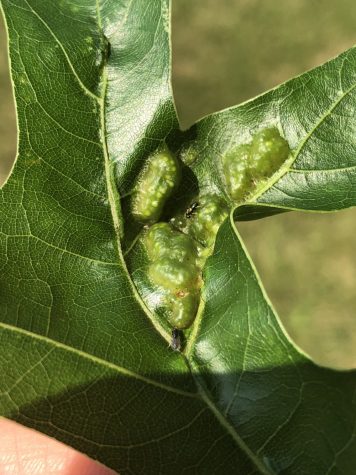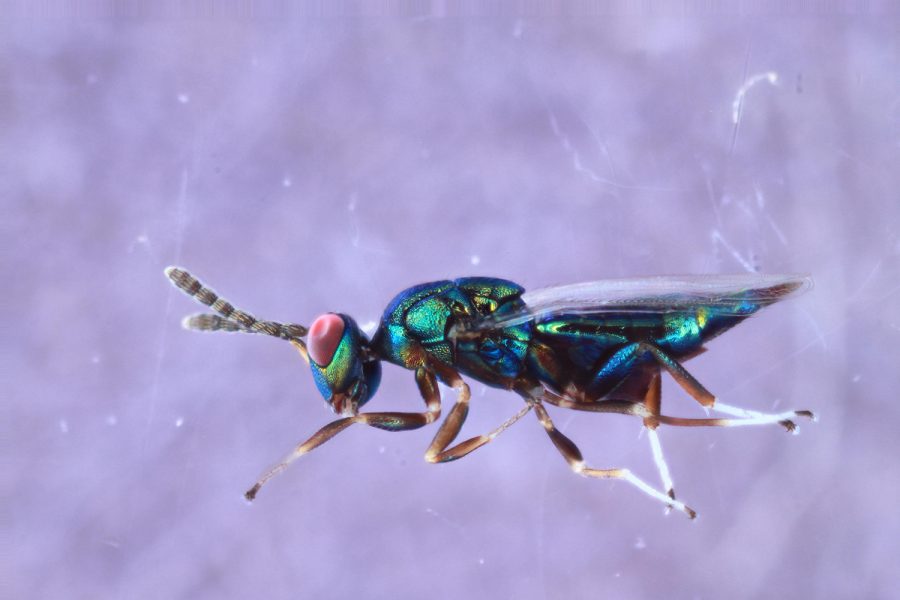Parasitic wasp species seen taking control of several hosts with ‘particularly grim’ behaviors
The University of Iowa Forbes Lab is making morbid discoveries of behavior in its research of parasitic wasp species.
October 13, 2019
University of Iowa Forbes Lab researchers documented evidence of a parasitic wasp called Euderus set that can use multiple species of the insect as its host.
UI Ph.D. candidate Anna Ward worked on the study of the insect’s behavior and said it isn’t often that one parasitic wasp species is able to manipulate many other host wasp species.
“Depending on the mechanism of the manipulation, it may limit the number of hosts it can manipulate successfully,” Ward said.
Ward said there are good examples of parasites taking control of multiple hosts in other systems — although not simultaneously — but that the team’s research is the first documented example with oak gall wasps. There are between 500 to 700 different species of oak gall wasps in North America alone, Ward said.
The diversity seen in wasps is indicative of the diversity seen overall in insects, said Andrew Forbes, an associate professor of biology and director of the environmental-science program.
“Insects are incredibly diverse. Within the insects, the most diverse are the parasitic wasps — or at least our lab has made a pretty strong argument that that’s the case,” Forbes said.
RELATED: Board of Regents approve University of Iowa’s request for degree in sustainability science
Forbes said the galls are structures wasps create on plants to protect their larvae.
“They’re these growths that are induced by a different group of herbivorous wasps on oaks,” Forbes said. “They lay an egg and it causes the oak to grow it’s tissue in a really different way. It makes these really baroque and elaborate growths of all different sorts.”
Ward said each species of wasp has its own unique gall structure, with a variety of defenses. However, Forbes said these gall’s defenses are not always sufficient, and they get attacked by up to 20 to 30 different species of parasitic wasps.
Forbes added that, in the course of its research, his team discovered a particularly grim display of parasitic behavior. The parasitic wasp is known as a “crypt-keeper.”
“Normally its host would chew a hole in the side of the gall and fly away. Instead, [the manipulated host] chews a smaller hole and then it plugs the hole with its head and the crypt-keeper eats its body and through the head of its host,” Forbes said.
RELATED: IMU garden aids pollinator insect populations
Forbes said the parasitic wasps, in another abnormal twist, were observed manipulating multiple hosts, seemingly based on the shape of the gall as opposed to genetic proximity.
“We think it must be attacking either right before the host wasp is turning into an adult inside the gall [or] close to when it’s starting to think about eating its way through the side of the gall,” Forbes said.

There is still some uncertainty as to when the manipulation of the host begins, Forbes said.
“We haven’t studied that part of the life cycle yet. We don’t really know exactly when the attack happens, but it is before it starts chewing the hole. We’ve done enough observations in the lab to know it starts at least several days before the wasp starts to exit,” Forbes said.
Omar Khodor, a UI undergraduate student in environmental science, had the responsibility of tracking when the parasites would emerge from the host.
“They were pretty consistent on average, but they could vary,” Khodor said. “Some emerged very rapidly, some took a while, and some began the process but died halfway through. There were many variations on what could have happened.”
Forbes said he admired how much of this research was driven by students — undergraduates and graduates.
“I realized I was much more interested in entomology than I thought I would be,” Khodor said.
Khodor said working on the study was a great learning experience as an undergraduate.
“Nothing can prepare you for research experience except research experience,” Khodor said. “Although it seems like when you’re taking [classes], they get really specific … they’re theoretical. It’s not like you have to encounter these niches of knowledge. There is a large learning curve to navigating to how specific this knowledge is.”





